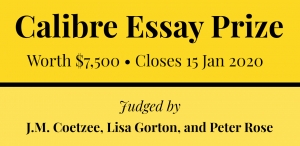Competitions and programs (114)
2019 Jolley Prize Judges
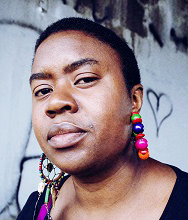
Maxine Beneba Clarke is a widely published Australian writer of Afro-Caribbean descent. Clarke's short fiction, non-fiction and poetry have been published in numerous publications including Overland, The Age, Meanjin, The Saturday Paper and The Big Issue. Her critically acclaimed short fiction collection Foreign Soil won the ABIA for Literary Fiction Book of the Year 2015 and the 2015 Indie Book Award for Début Fiction, and was shortlisted for the 2015 Stella Prize. She was one of the Sydney Morning Herald's Best Young Novelists for 2015. Clarke has published three poetry collections including Carrying the World, which won the Victorian Premier's Literary Award for Poetry 2017 and was shortlisted for the Colin Roderick Award. The Hate Race, a memoir about growing up black in Australia won the NSW Premier's Literary Award Multicultural NSW Award 2017 and was shortlisted for an ABIA, an Indie Award, the Victorian Premier's Literary Awards and Stella Prize. The Patchwork Bike, her first picture book with Van T. Rudd was a CBCA Honour Book for 2017.
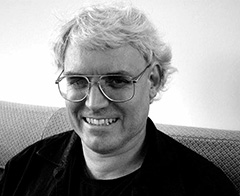
John Kinsella is the author of over forty books. His most recent publications include the novel Lucida Intervalla (UWA Publishing 2018), Open Door (UWA Publishing, 2018); On the Outskirts (UQP, 2017), and Drowning in Wheat: Selected poems (Picador, 2016). His poetry collections have won a variety of awards, including the Prime Minister's Literary Award for Poetry and the Christopher Brennan Award for Poetry. His volumes of stories include In the Shade of the Shady Tree (Ohio University Press, 2012), Crow’s Breath (Transit Lounge, 2015), and Old Growth (Transit Lounge, 2017). His volumes of criticism include Activist Poetics: Anarchy in the Avon Valley (Liverpool University Press, 2010) and Polysituatedness (Manchester University Press, 2017). He is a Fellow of Churchill College, Cambridge University, and Professor of Literature and Environment at Curtin University. With Tracy Ryan he is the co-editor of The Fremantle Press Anthology of The Western Australian Poetry (2017). He lives with his family in the Western Australian wheatbelt.
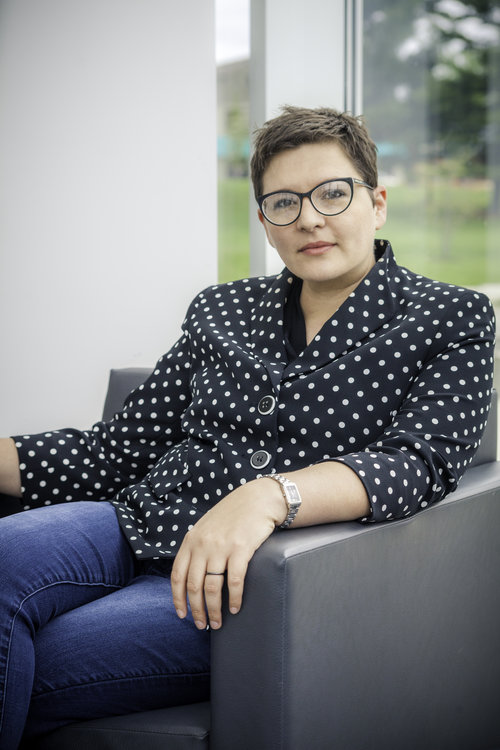
Beejay Silcox is an Australian writer, literary critic and cultural commentator, and the recipient of ABR’s Fortieth Birthday Fellowship. Her award-winning short fiction has been published at home and internationally and recently anthologised in Meanjin A-Z: Fine Fiction 1980 to Now, and Best Summer Stories 2018. Her story ‘Slut Trouble’ was commended in the 2016 Jolley Prize and republished in Best Australian Stories 2017. She is currently based in Cairo - writing from a house in the middle of an island, in the middle of the Nile.
2019 ABR Elizabeth Jolley Short Story Prize
2019 Jolley Prize Winner: Sonja Dechian
ABR is delighted to announce that Sonja Dechian is the overall winner of the 2019 ABR Elizabeth Jolley Short Story Prize for her story ‘The Point-Blank Murder’. Sonja Dechian receives $5,000. Raaza Jamshed was placed second for her story 'Miracle Windows', and Morgan Nunan was placed third for his story 'Rubble Boy'. We would like to congratulate all three shortlisted entrants and thank all those who entered their stories in the Jolley Prize.
The ABR Elizabeth Jolley Short Story Prize is one of the country’s most prestigious awards for short fiction. This year the Jolley Prize attracted almost 1,400 entries from 35 different countries. The judges were Maxine Beneba Clarke, John Kinsella, and Beejay Silcox. The three shortlisted stories appear in our September Fiction 2018 issue.
The judges have also commended three stories: 'Hero Manifest' by Bill Collopy, 'Lizard Boy' by Brendan Sargeant, and 'Supermarket Love' by Elleke Boehmer. The commended stories will appear online in due course. The shortlisted and commended stories were selected from a longlist of ten stories, all listed below.
About the 2019 Jolley Prize finalists:
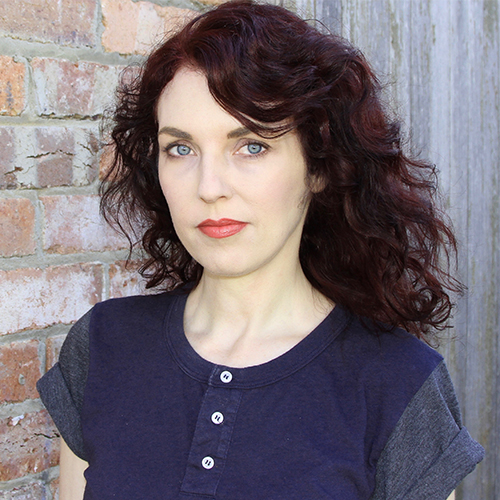 WINNER
WINNER
Sonja Dechian is the author of the short story collection An Astronaut’s Life, which won the 2016 UTS Glenda Adams Award for New Writing and was shortlisted for the Steele Rudd Award the same year. Her writing has previously appeared in The Best Australian Stories, New Australian Stories 2, and elsewhere. She has co-edited two books of children’s writing about the Australian refugee experience, No Place Like Home and Dark Dreams.
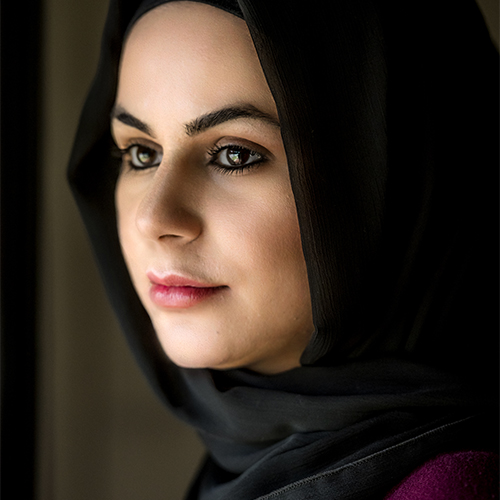 SECOND
SECOND
Raaza Jamshed is a writer and researcher drawn to the poetics of gender, language, and identity. She is a Doctor of Creative Arts candidate at Western Sydney University and is currently compiling her short fiction in a collection. Two of her recent stories have been published in Meanjin. Raaza has lived in four different continents in the last decade; she currently resides in the historic town of Richmond, New South Wales, with her husband, two children and a small band of Arab horses.
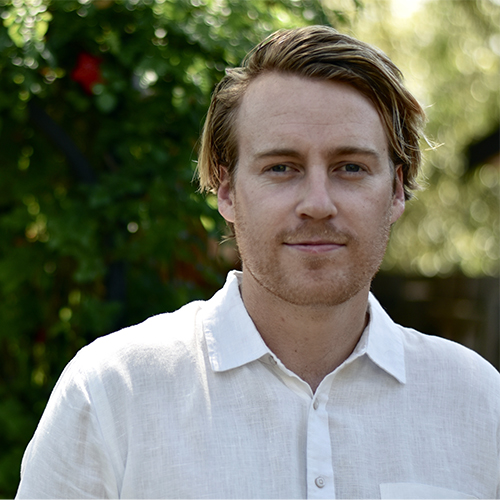 THIRD
THIRD
Morgan Nunan is an emerging Australian writer based in Melbourne. He currently studies creative writing at RMIT University. His short fiction has been published in a number of Australian literary magazines, most recently appearing in Gargouille Literary Journal. As a practising media lawyer, Morgan is an adviser to several large media and technology organisations. He holds a BA (English) and LLB from La Trobe University.
The 2019 Jolley Prize longlist
Commended: 'Supermarket Love' by Elleke Boehmer (United Kingdom)
Commended: 'Hero Manifest' by Bill Collopy (Victoria)
'The Manque' by Steph Cornish (New South Wales)
Winner: 'The Point-Blank Murder' by Sonja Dechian (Victoria)
'The Net' by D.J. Huppatz (Victoria)
Second: 'Miracle Windows' by Raaza Jamshed (New South Wales)
'Rewilding' by Jennifer Mills (South Australia)
Third: 'Rubble Boy' by Morgan Nunan (Victoria)
Commended: 'Lizard Boy' by Brendan Sargeant (ACT)
'Holding the Torch' by Tracey Slaughter (New Zealand)
Please read the Frequently Asked Questions page before contacting us with queries about the Jolley Prize.
Click here for more information about past winners and to read their stories
ABR gratefully acknowledges Mr Ian Dickson's generous support for the Jolley Prize.
2019 Calibre Essay Prize Judges
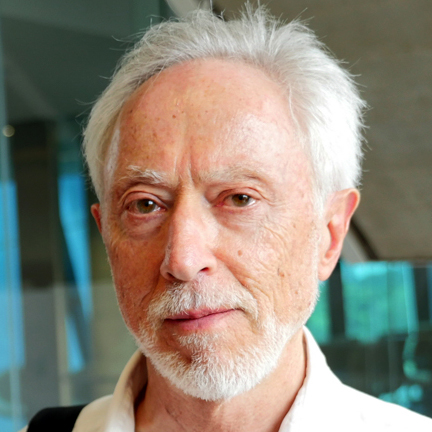 J.M. Coetzee was born in South Africa and educated in South Africa and the United States. He has published nineteen works of fiction, as well as criticism and translations. Among awards he has won are the Booker Prize (twice) and, in 2003, the Nobel Prize for Literature. He is currently Professorial Research Fellow at the University of Adelaide.
J.M. Coetzee was born in South Africa and educated in South Africa and the United States. He has published nineteen works of fiction, as well as criticism and translations. Among awards he has won are the Booker Prize (twice) and, in 2003, the Nobel Prize for Literature. He is currently Professorial Research Fellow at the University of Adelaide.
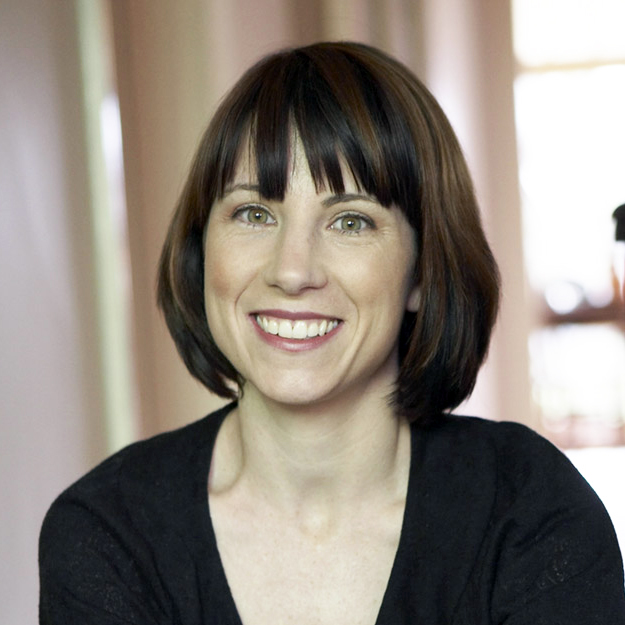 Lisa Gorton, who lives in Melbourne, is a poet, novelist, and critic, and a former Poetry Editor of ABR. She studied at the Universities of Melbourne and Oxford. A Rhodes Scholar, she completed a Masters in Renaissance Literature and a Doctorate on John Donne at Oxford University. Her review essays and poetry have appeared in ABR since 2002. Her first poetry collection, Press Release (2007), won the Victorian Premier’s Prize for Poetry. She has also been awarded the Vincent Buckley Poetry Prize and the Philip Hodgins Memorial Medal. Lisa’s novel The Life of Houses (2015) shared the 2016 Prime Minister’s Award for fiction and received the NSW Premier’s People’s Choice Award. Her third poetry collection Empirical appeared with Giramondo in 2019.
Lisa Gorton, who lives in Melbourne, is a poet, novelist, and critic, and a former Poetry Editor of ABR. She studied at the Universities of Melbourne and Oxford. A Rhodes Scholar, she completed a Masters in Renaissance Literature and a Doctorate on John Donne at Oxford University. Her review essays and poetry have appeared in ABR since 2002. Her first poetry collection, Press Release (2007), won the Victorian Premier’s Prize for Poetry. She has also been awarded the Vincent Buckley Poetry Prize and the Philip Hodgins Memorial Medal. Lisa’s novel The Life of Houses (2015) shared the 2016 Prime Minister’s Award for fiction and received the NSW Premier’s People’s Choice Award. Her third poetry collection Empirical appeared with Giramondo in 2019.
 Peter Rose has been Editor of Australian Book Review since 2001. Previously he was a publisher at Oxford University Press. His reviews and essays have appeared mostly in ABR. He has published six books of poetry, two novels, and a family memoir, Rose Boys (Text Publishing), which won the 2003 National Biography Award. He edited the 2007 and 2008 editions of The Best Australian Poems (Black Inc.). His most recent publication is a volume of poems, The Subject of Feeling (UWA Publishing, 2015).
Peter Rose has been Editor of Australian Book Review since 2001. Previously he was a publisher at Oxford University Press. His reviews and essays have appeared mostly in ABR. He has published six books of poetry, two novels, and a family memoir, Rose Boys (Text Publishing), which won the 2003 National Biography Award. He edited the 2007 and 2008 editions of The Best Australian Poems (Black Inc.). His most recent publication is a volume of poems, The Subject of Feeling (UWA Publishing, 2015).
2020 Calibre Essay Prize
The winner of the 2020 Calibre Essay Prize is Yves Rees for their essay 'Reading the Mess Backwards' which appears in our June-July 2020 issue. The runner up is Kate Middleton for her essay 'The Dolorimeter' which will appear in the August 2020 issue.
For more information about Yves Rees and Kate Middleton and the results of the 2020 Calibre Essay Prize click here.
Prize money: $7,500
Closed: 15 January 2020, 11:59 pm
Judges: J.M. Coetzee, Lisa Gorton, and Peter Rose
The Calibre Essay Prize is open to all essayists writing in English. We seek essays of between 2,000 and 5,000 words on any subject. We welcome essays of all kinds: personal or political, literary or speculative, traditional or experimental. Founded in 2007, the Calibre Prize is one of the world’s leading prizes for a new non-fiction essay. We look forward to running the Calibre Essay Prize again in 2021.
Click the link for more information about past winners and to read their essays.
Please read our Frequently Asked Questions before contacting us with queries about the Calibre Prize.
Before entering the Calibre Essay Prize, all entrants must read the Terms and Conditions.
Exclusivity
Entries may be offered elsewhere during the judging of the Calibre Prize. If an entrant is longlisted and has their essay offered elsewhere, the entrant will have 24 hours to decide if they would like to withdraw their essay on offer elsewhere or from the Calibre Prize. Exclusivity is essential for longlisted essays. The overall winning essay will be published in the magazine in the May 2020 with the runner-up to be published later in the year.
Entry fees
Online entry (current ABR subscriber) - $15
Online entry (full-time student) - $15
Online entry (standard/non subscriber) - $25*
*Non-subscribers will receive the digital edition of ABR free of charge for four months. Eligible entrants will be emailed with details when this complimentary subscription has been activated within the month following entry.
Special online entry + subscription bundles:
Subsequent entries may be submitted at the subscriber rate
Online entry + Digital subscription - $65
Online entry + Print subscription (Australia) - $100
Online entry + Print subscription (NZ and Asia) - $165
Online entry + Print subscription (Rest of World) - $180
We gratefully acknowledge the long-standing support of Colin Golvan AM QC, and Peter McLennan and Mary-Ruth Sindrey.
2018 Jolley Prize winner: Madelaine Lucas
Announcing the 2018 Jolley Prize winner
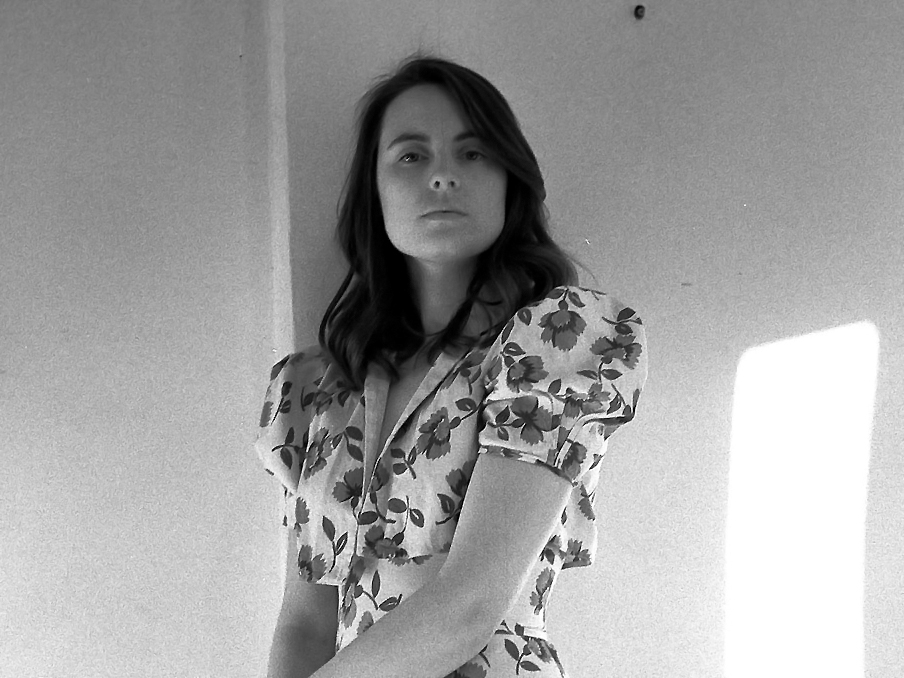 ABR is delighted to announce Madelaine Lucas as the overall winner of the 2018 ABR Elizabeth Jolley Short Story Prize for her story ‘Ruins’. Madelaine Lucas receives $7,000. Sharmini Aphrodite was placed second for her story 'Between the Mountain and the Sea' and Claire Aman placed third for her story 'Vasco'. We would like to congratulate all three shortlisted entrants and thank all those who entered their stories in the Jolley Prize.
ABR is delighted to announce Madelaine Lucas as the overall winner of the 2018 ABR Elizabeth Jolley Short Story Prize for her story ‘Ruins’. Madelaine Lucas receives $7,000. Sharmini Aphrodite was placed second for her story 'Between the Mountain and the Sea' and Claire Aman placed third for her story 'Vasco'. We would like to congratulate all three shortlisted entrants and thank all those who entered their stories in the Jolley Prize.
The ABR Elizabeth Jolley Short Story Prize is one of the country’s most prestigious awards for short fiction. This year the Jolley Prize attracted almost 1,200 entries from forty-two different countries. The judges were Patrick Allington, Michelle Cahill, and Beejay Silcox. The three shortlisted stories appear in our August 2018 issue.
About Madelaine Lucas
Madelaine Lucas is an Australian writer and musician based in Brooklyn,New York. She is the senior editor of NOON literary annual and a teaching fellow at Columbia University, where she is completing her MFA in fiction. She has been the winner of the Overland/Victoria University Short Fiction Prize and was shortlisted for the Griffith University Josephine Ulrick Literature Prize. She is currently at work on her first novel. Read her winning story 'Ruins'.
Listen below to Madelaine Lucas reading an extract from 'Ruins'.
2019 Porter Prize Judges
 Judith Bishop is Director of Linguistic Services at a multinational language technology company. Her poems have won many awards, including the Peter Porter Poetry Prize (2006, 2011). Her first book, Event (Salt, 2007), won the FAW Anne Elder award and was shortlisted for the CJ Dennis Prize, the Judith Wright Calanthe Award, and the ASAL Mary Gilmore Prize. She has recently published a second collection, Interval (UQP, 2018).
Judith Bishop is Director of Linguistic Services at a multinational language technology company. Her poems have won many awards, including the Peter Porter Poetry Prize (2006, 2011). Her first book, Event (Salt, 2007), won the FAW Anne Elder award and was shortlisted for the CJ Dennis Prize, the Judith Wright Calanthe Award, and the ASAL Mary Gilmore Prize. She has recently published a second collection, Interval (UQP, 2018).
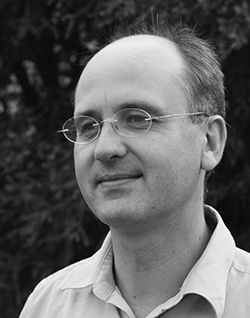
John Hawke is a Senior Lecturer, specialising in poetry, at Monash University. His books include Australian Literature and the Symbolist Movement, Poetry and the Trace (co-edited with Ann Vickery), and the volume of poetry Aurelia, which received the 2015 Anne Elder award. He is ABR's Poetry Editor.
 Paul Kane is poetry editor of Antipodes and artistic director of the Mildura Writers Festival. His most recent books are Renga: 100 Poems (with John Kinsella) and A Passing Bell: Ghazals for Tina. He teaches at Vassar College, as Professor of English, and divides his time between New York and rural Victoria.
Paul Kane is poetry editor of Antipodes and artistic director of the Mildura Writers Festival. His most recent books are Renga: 100 Poems (with John Kinsella) and A Passing Bell: Ghazals for Tina. He teaches at Vassar College, as Professor of English, and divides his time between New York and rural Victoria.
2019 Peter Porter Poetry Prize
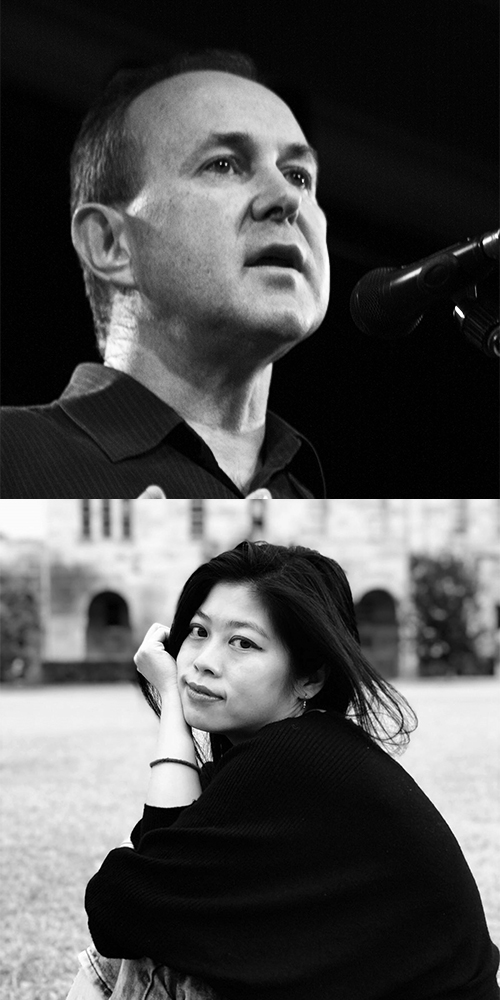 Andy Kissane and Belle Ling, joint winners of the 2019 Peter Porter Poetry Prize.Andy Kissane and Belle Ling are the joint winners of the 2019 Peter Porter Poetry Prize, worth a total of $8,500. This is Australia’s premier prize for an original poem. Andy Kissane's winning poem is titled 'Searching the Dead', and Belle Ling's winning poem is titled '63 Temple Street, Mong Kok'.
Andy Kissane and Belle Ling, joint winners of the 2019 Peter Porter Poetry Prize.Andy Kissane and Belle Ling are the joint winners of the 2019 Peter Porter Poetry Prize, worth a total of $8,500. This is Australia’s premier prize for an original poem. Andy Kissane's winning poem is titled 'Searching the Dead', and Belle Ling's winning poem is titled '63 Temple Street, Mong Kok'.
The winners were named at a ceremony at fortyfivedownstairs in Melbourne on 18 March 2019.
This year’s judges – Judith Bishop, John Kawke, Paul Kane – shortlisted five poems from almost 900 entries, from 28 countries. The shortlisted poets were John Foulcher (ACT), Ross Gillett (Vic.), Andy Kissane (NSW), Belle Ling (QLD/Hong Kong), and Mark Tredinnick (NSW).
Porter Prize judge Judith Bishop (representing the judges) commented:
‘In Belle Ling’s “63 Temple St, Mong Kok”, other voices are rendered equally as vividly as the speaker’s own. Together they create the generous and gentle texture of this exceptionally resonant work.’
‘Andy Kissane’s “Searching the Dead” recounts a moment in Australian history – our soldiers’ involvement in the Vietnam War – that has not been captured before in this way. This dense, strongly physical and evocative poem grips the reader’s mind and body, and that imprint remains long after reading.’
About the shortlisted poets:
John Foulcher has written eleven books of poetry, most recently 101 Poems (Pitt Street Poetry 2015), a selection from his previous books, and A Casual Penance (Pitt Street Poetry 2017). His work has appeared in Australian magazines and anthologies for more than thirty-five years, and he has received and been shortlisted for many awards. He divides his time between Canberra and an old Catholic church which he is renovating near the town of Braidwood in New South Wales.
Ross Gillett is a Melbourne-born poet who now lives in Daylesford. In 2010 he published a chapbook of old and new poems – Wundawax and other poems – with Mark Time Books. His next book will be published by Puncher & Wattmann later in 2019. He has won numerous Australian poetry awards, including the Broadway Poetry Prize, the FAW John Shaw Neilson Award (twice), and, most recently, the 2018 Newcastle Poetry Prize. He has been twice shortlisted for the Blake Poetry Prize. Ross’s previous career was with the Victorian Public Service, finishing as a project manager for the Department of Environment, Land, Water and Planning in Ballarat and Daylesford, where he specialised in the implementation of native title agreements.
Andy Kissane has published a novel, a book of short stories, The Swarm, and four books of poetry. Awards for his poetry include the Fish International Poetry Prize, the Australian Poetry Journal’s Poem of the Year and the Tom Collins Poetry Prize. Radiance (Puncher & Wattmann, 2014) was shortlisted for the Victorian and Western Australian Premier’s Prizes for Poetry and the Adelaide Festival Awards. He recently co-edited a book of criticism on Australian poetry, Feeding the Ghost. His fifth poetry collection, The Tomb of the Unknown Artist will be published in June 2019. He teaches English and lives in Sydney.
Belle Ling is a PhD student in Creative Writing at The University of Queensland. Her poetry manuscript, Rabbit-Light, was awarded Highly Commended in the 2018 Arts Queensland Thomas Shapcott Poetry Prize. Her first poetry collection, A Seed and a Plant, was shortlisted for The HKU International Poetry Prize 2010. Her poem, ‘That Space’, was placed second in the ESL category of the International Poetry Competition organized by the Oxford Brookes University in October 2016. She was awarded a Merit Scholarship at the New York State Summer Writers Institute in 2017.
Mark Tredinnick is a poet, essayist, and teacher. He is the author of The Blue Plateau: A Landscape Memoir, which won the Queensland Premier’s Literary Award and was shortlisted for the Prime Minister’s Literary Award), and Fire Diary, a book of poetry that won the WA Premier’s Book Prize. Beyond these, Mark is author of nine other acclaimed works of poetry and prose. Mark has also written several books on writing itself. He was co-winner of the 2008 Calibre Prize for his essay ‘A Storm and a Teacup’, and he won the Montreal Poetry Prize in 2011 and the Cardiff Poetry Prize in 2012.
Click here for more information about past winners and to read their poems.
We look forward to offering the Porter Prize again in 2020.
We gratefully acknowledge the long-standing support of Morag Fraser AM, and the support of ABR Patrons. The print is donated by Ivan Durrant in honour of Georges Mora.
2018 Calibre Essay Prize winner
Lucas Grainger-Brown is the winner of the twelfth Calibre Essay Prize – Australia’s most prestigious essay prize. The judges – novelist Andrea Goldsmith, NewSouth Executive Publisher Phillipa McGuinness, and ABR Editor Peter Rose – chose Lucas’s essay ‘We Three Hundred’ from a field of over 200 essays submitted from thirteen countries. Lucas receives $5,000, and his essay appears in the April 400th issue of Australian Book Review.
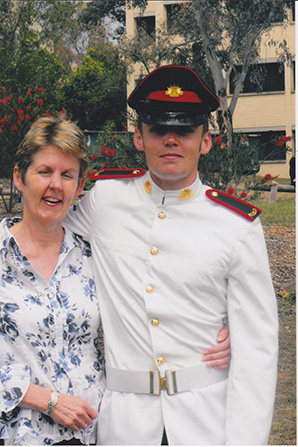
‘We Three Hundred’ is a candid and unsentimental account of life as a cadet at the Australian Defence Force Academy in Canberra for a bookish, idealistic adolescent straight out of high school.
On learning that he had won the Calibre Essay Prize, Lucas Grainger-Brown commented: ‘It is an incredible honour to win the Calibre Essay Prize. When I was ready to write out this formative story, I knew I had to submit it to the Calibre Prize. Australian Book Review provides a fantastic national platform for the appreciation of Australian arts, ideas and culture. I hope my essay is read as a constructive addition to the ongoing dialogue about who we are and where we are going.’
This winner of the second prize, worth $2,500, is Kirsten Tranter. Her essay, entitled ‘Once Again’, will be published in an upcoming issue.
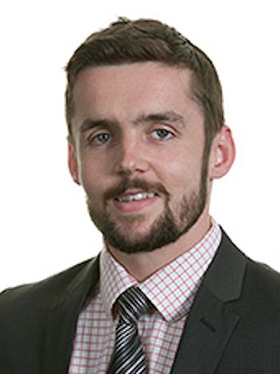 About Lucas Grainger Brown
About Lucas Grainger Brown
Lucas Grainger-Brown joined the Australian Defence Force as a high school student. Subsequently he worked as a management consultant. He is a researcher, tutor, and doctoral candidate at The University of Melbourne. Philosophy and politics are his enduring passions. He has published commentary, essays, and fiction across numerous media. He first wrote for ABR in 2016.
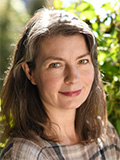 About Kirsten Tranter
About Kirsten Tranter
Kirsten Tranter lives in the San Francisco Bay Area. She is the author of three novels, including Hold (2016), longlisted for the Miles Franklin Award. She completed a PhD in English Literature at Rutgers University in 2008, and publishes essays, journalism, and literary criticism. She is a founder of the Stella Prize for Australian women’s writing.
Longlisted entries
Judith Bishop (VIC)‘O Brave New World, That Has Such Data In’t (Love and Self-Understanding in an Algorithmic Age)’
Sally Kerry Fox (UK)
‘The Lives We Leave Behind’
David M. A. Francis (VIC)
‘Between Joy and Sorrow: A Journey of the Hands’
Karen Holmberg (US)
‘The Very Worst Ache Is Not Knowing Why: Remembering Mme. Cluny’
Jack Jeweller (NSW)
‘Wings with Words’
Daryl Li (Singapore)
‘Metamorphoses’
Lea Zusmanovicha (VIC)
‘The Tails of Blankets’
Further information
![]() Click here to download the media release
Click here to download the media release
Subscribe to ABR Online to gain access to this issue online, plus the ABR archive.
Click here for more information about past winners and to read their essays.
We look forward to offering the Calibre Essay Prize again in 2019.
We gratefully acknowledge the long-standing support of Mr Colin Golvan QC and the ABR Patrons.
2018 Peter Porter Poetry Prize winner
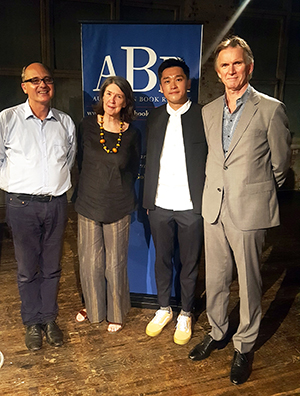 John Hawke, Morag Fraser, Nicholas Wong, and Peter RoseNicholas Wong is the winner of the 2018 Peter Porter Poetry Prize, now worth a total of $8,500. This is Australia’s premier prize for an original poem. Louis Klee, the 2017 winner, made the announcement at a special event at fortyfivedownstairs on Monday, 19 March. Nicholas Wong, who flew from Hong Kong to attend the Porter ceremony, receives $5,000.
John Hawke, Morag Fraser, Nicholas Wong, and Peter RoseNicholas Wong is the winner of the 2018 Peter Porter Poetry Prize, now worth a total of $8,500. This is Australia’s premier prize for an original poem. Louis Klee, the 2017 winner, made the announcement at a special event at fortyfivedownstairs on Monday, 19 March. Nicholas Wong, who flew from Hong Kong to attend the Porter ceremony, receives $5,000.
His winning poem is titled ‘101, Taipei’.
This year’s judges – John Hawke, Bill Manhire, Jen Webb – shortlisted poems by five poets – Eileen Chong, Katherine Healy, LK Holt, Tracey Slaughter, and Nicholas Wong. They were chosen from a record field of almost 1,000 poems. Tracey Slaughter’s poem ‘breather’ was placed second. She receives $2,000 – the other three shortlisted poets $500 each.
Nicholas Wong, on winning the Prize, said: ‘I’m honoured and humbled to be the winner, especially with a poem whose subject matter may seem foreign. Winning the Porter Prize also allows me to reach out to Australian readers.’
John Hawke – chair of the judging panel and Poetry Editor of ABR – commented: ‘Nicholas Wong’s “101, Taipei” is a powerful representation of urban dislocation, which cuts across cultures and languages in its swerving indirections and switches in style and syntax.’
Peter Rose – Editor of Australian Book Review – commented: ‘We’re delighted that Nicholas Wong, with his superb poem, becomes the first Asian to win one of ABR’s three literary prizes. This is good for world poets and the Porter Prize, and is a measure of greater awareness of ABR overseas.’
About Nicholas Wong
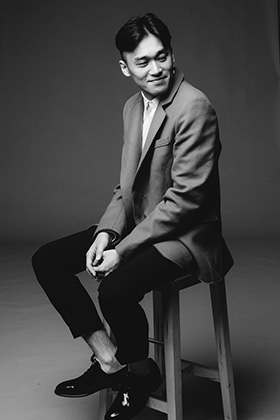 Nicholas Wong is the author of Crevasse (Kaya Press, 2015), winner of the Lambda Literary Award in Gay Poetry. He is also the recipient of the Hong Kong Young Artist Award in Literary Arts in 2017. Wong has contributed writing to the radio composition project ‘One of the Two Stories, Or Both’ at Manchester International Festival 2017, and the final exhibition of Robert H.N. Ho Family Foundation Chinese Art Initiative at Solomon R.Guggenheim Museum, which will open in May 2018. He is the Vice President of PEN Hong Kong, and teaches atthe Education University of Hong Kong.
Nicholas Wong is the author of Crevasse (Kaya Press, 2015), winner of the Lambda Literary Award in Gay Poetry. He is also the recipient of the Hong Kong Young Artist Award in Literary Arts in 2017. Wong has contributed writing to the radio composition project ‘One of the Two Stories, Or Both’ at Manchester International Festival 2017, and the final exhibition of Robert H.N. Ho Family Foundation Chinese Art Initiative at Solomon R.Guggenheim Museum, which will open in May 2018. He is the Vice President of PEN Hong Kong, and teaches atthe Education University of Hong Kong.
Further information
The Peter Porter Poetry Prize is one of Australia’s most prestigious poetry awards. For more information about the Peter Porter Poetry Prize or to read the 2018 shortlisted poems please visit the ABR website.
Nicholas Wong's winning poem is published in the March 2018 issue of ABR.
![]() Click here to download the media release
Click here to download the media release
Subscribe to ABR Online to gain access to this issue online, plus the ABR archive.
Click here for more information about past winners.
Click here for more information about the judges.
ABR gratefully acknowledges the support of Ms Morag Fraser AM and Mr Ivan Durrant.
2018 ABR Elizabeth Jolley Short Story Prize
ABR is delighted to announce Madelaine Lucas as the overall winner of the 2018 ABR Elizabeth Jolley Short Story Prize for her story ‘Ruins’. Madelaine Lucas receives $7,000.
Sharmini Aphrodite was placed second for her story 'Between the Mountain and the Sea' and Claire Aman placed third for her story 'Vasco'. We would like to congratulate all three shortlisted entrants and thank all those who entered their stories in the Jolley Prize.
This year the prestigious ABR Elizabeth Jolley Short Story Prize Prize attracted almost 1,200 entries from around the world. The 2018 Jolley Prize is worth a total of $12,500, with a first prize of $7,000 and supplementary prizes of $2,000 and $1,000. The judges were Patrick Allington, Michelle Cahill, and Beejay Silcox. The three shortlisted stories appear in our August issue.
The judges also commended three other stories: ‘Joan Mercer’s Fertile Head’ by S.J. Finn (Vic.), ‘Hardflip’ by Mirandi Riwoe (QLD), and ‘Break Character’ by Chloe Wilson (Vic.). The commended authors each receive $850.
About the 2018 Jolley Prize shortlisted authors
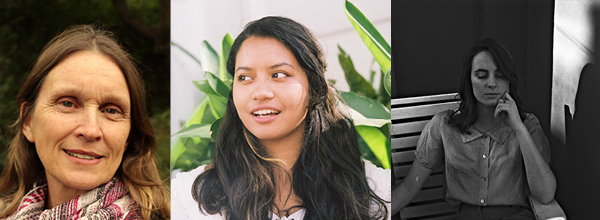 Claire Aman (photograph by Ravi Watt-Nersesian), Sharmini Aphrodite (photograph by Verkur), Madelaine Lucas
Claire Aman (photograph by Ravi Watt-Nersesian), Sharmini Aphrodite (photograph by Verkur), Madelaine Lucas
Claire Aman grew up in Melbourne and settled in Grafton, New South Wales.Text published her short story collection, Bird Country, in 2017. Her stories have been published in Australian journals and anthologies and have won the E.J. Brady, Wet Ink and Hal Porter prizes. In 2011 her story ‘Milk Tray’ was shortlisted for the Jolley Prize. Her early writing life was nurtured by Varuna.
Sharmini Aphrodite was born in Borneo in 1995 and grew up in the sister cities of Singapore and Johor Bahru. Previously published in Cha: An Asian Literary Journal and Smokelong Quarterly, she was runner-up for her art criticism in Frieze Magazine’s Art Writing Prize, as well as in the Golden Point Awards.
Madelaine Lucas is an Australian writer and musician based in Brooklyn,New York. She is the senior editor of NOON literary annual and a teaching fellow at Columbia University, where she is completing her MFA in fiction. She has been the winner of the Overland/Victoria University Short Fiction Prize and was shortlisted for the Griffith University Josephine Ulrick Literature Prize. She is currently at work on her first novel.
The 2018 Jolley Prize longlist
‘Hoofman’ by Tiffany Allan (New Zealand)
‘Vasco’ by Claire Aman (NSW) – Shortlisted
‘Between the Mountain and the Sea’ Sharmini Aphrodite (Singapore) – Shortlisted
‘La selva obscura’ by Faye Brinsmead (ACT)
‘The Great Explorer has never seen anything equal to this land in his life’ by Craig Cormick (ACT)
‘Katterzems’ by Joel Ephraims (NSW)
‘Joan Mercer's Fertile Head’ by S.J. Finn (Vic.) – Commended
‘Zohira’ by Michelle Hamadache (NSW)
‘Ruins’ by Madelaine Lucas (NSW/USA) – Winner
‘The Art of Waving’ by Andrea Macleod (QLD)
‘Hardflip’ by Mirandi Riwoe (QLD) – Commended
‘Find Me This Place’ by Ben Walter (Tas.)
‘Break Character’ by Chloe Wilson (Vic.) – Commended
‘All We Need to See’ by Michelle Wright (Vic.)
Please read the Frequently Asked Questions page before contacting us with queries about the Jolley Prize.
Click here for more information about past winners and to read their stories
ABR gratefully acknowledges Mr Ian Dickson's generous support for the Jolley Prize.


